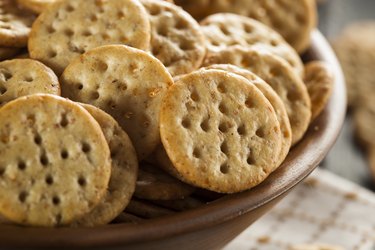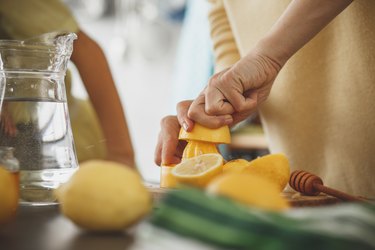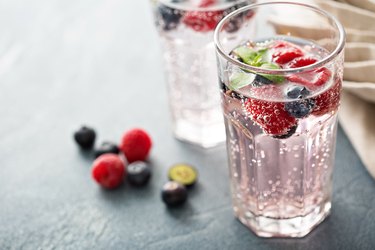

The Refresh is helping you freshen up on your oral-care knowledge and upgrade your dental-hygiene routine.
It's been drilled into your head that candy and soda are terrible for your teeth — probably since kindergarten. And while it's a good idea to stay away from consuming excess sugar for a variety of health reasons, there are other — perhaps more surprising — foods and eating habits that damage your teeth.
Basically, the "worst food list" falls into two categories: foods that are acidic and foods that stick to your teeth, Nammy Patel, DDS, of Green Dentistry in San Francisco, tells LIVESTRONG.com. This advice comes from seeing more than 16,000 mouths in her 16 years of practice.
Video of the Day
Video of the Day
Both can wear away your protective tooth enamel, which leaves you more vulnerable to calcium deposits (aka tartar), cavities and infections, per the American Dental Association. It can also make your teeth appear more yellow and feel more sensitive.
The good news is that just because they're bad for your teeth doesn't mean you have to avoid them completely. In fact, many of the foods on this list are really good for you, and you should keep them in your diet. Just tweak how you eat or drink them and you're good to go.
1. Some Salad Dressings
If you're spritzing your greens with a dressing that contains an acid, you'll want to be cautious with your chompers.
Uncooked acids can wear down your enamel, Dr. Patel says. And most good dressings contain some sort of acid, like fresh lemon juice or vinegar.
The fix: Sit down and mindfully eat your salad rather than grazing on it for an hour while doing work. After you’re done, rinse out your mouth with water, Dr. Patel advises.
2. Crackers, Chips and Other Carb-y Foods

This group fits squarely into the bucket of "foods that stick to your teeth." They may be tasty, but they're not doing your mouth any favors.
"Carbohydrates stick to your teeth and break down into sugar. The result is a party for the bacteria in your mouth that leads to cavities," Dr. Patel says.
That's the reason high-sugar sticky foods like candy and cookies can also do a number on your teeth.
The fix: Limit these types of foods, or make sure to rinse or brush after eating them.
3. Foods That Cause Acid Reflux
Acid reflux is, as you might guess from its name, not kind to your teeth. That's thanks to the repetitive exposure to stomach acid bubbling up into the mouth.
In one October 2017 study in BMC Gastroenterology, 60 percent of people who had dental erosion also had gastroesophageal reflux (GERD). (There's some good news, though: The study concluded that being treated for GERD stopped this damage to tooth enamel.)
The fix: It’s best to determine the foods that trigger your symptoms. This will be different for everyone, but according to the National Institute of Diabetes and Digestive and Kidney Diseases (NIDDK), the following are common culprits:
- Acidic foods like citrus and tomatoes
- Alcohol
- Chocolate
- Coffee and other caffeine-containing food and drinks
- High-fat foods
- Mint
- Spicy foods
4. Lemon Water

Maybe you sip lemon water through the afternoon or drink it first thing before your coffee.
"Lemon water is so good for your body, but it's the most horrendous thing for your teeth," Dr. Patel says.
That's because the lemon makes it an acidic drink, and sipping it throughout the day bathes your teeth continuously in the lemon's acids.
The fix: “Don’t let it touch your teeth — drink it through a straw,” Dr. Patel says.
5. Citrus Fruits
Oranges and grapefruit may be perfect for breakfast or a midday snack, but just like lemons, they're…ding, ding, ding…acidic.
The fix: “Eat citrus, but swish your mouth out with water after,” Dr. Patel says.
6. Flavored Sparkling Waters

If you're a sparkling water die-hard, check the label. Your favorite seltzer may contain added fruit juice, sugar, natural flavors or citric acids.
These flavors are what may erode your enamel — especially if you're drinking several throughout the day.
The fix: For her patients who love sparkling water, Dr. Patel urges them to take a plain sparkling water and add a couple shakes of bitters to the mix. It’s also the perfect end-of-day mocktail when it’s a booze-free day or you’re living that sober-curious lifestyle.
7. All-Day Grazing
OK, this one's not a food, but more of an eating habit. After you eat, the pH of your mouth drops (lower pH is a more acidic environment), and it takes 20 minutes after you finish eating for that pH to rise and your mouth to equalize.
"If you're snacking all day, your mouth is more acidic, and you're more prone to cavities," Dr. Patel says.
The fix: Plan for three meals and two defined snack times during the day. Don’t rush through eating (that can lead to other problems, like bloating), but finish up promptly and rinse your mouth out with water, and then drink water throughout the day.
The more water you drink, the more your mouth gets washed out. Sipping plain H2O also protects you from dreaded dry mouth, which is also linked to tooth decay.
So, What Should You Eat for Healthy Teeth?
In general, the best diet for your smile is one that's been found to be best for your health, per a 2019 research review in Caries Research:
- Limit added sugars, saturated fat and salt
- Eat more fresh fruits, vegetables, nuts and seeds, whole grains, legumes, fish and lean meat
- Drink lots of water
Bon appétit for your teeth!
- BMC Gastroenterology: “Longitudinal study of gastroesophageal reflux and erosive tooth wear”
- National Institute of Diabetes and Digestive and Kidney Diseases: “Eating, Diet, & Nutrition for GER & GERD”
- Carries Research: "Sugar Restriction for Caries Prevention: Amount and Frequency. Which Is More Important?"
- American Dental Association: "Erosion: What You Eat and Drink Can Impact Teeth"
Is this an emergency? If you are experiencing serious medical symptoms, please see the National Library of Medicine’s list of signs you need emergency medical attention or call 911.